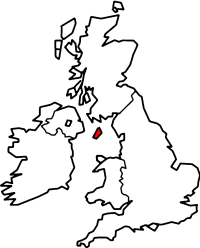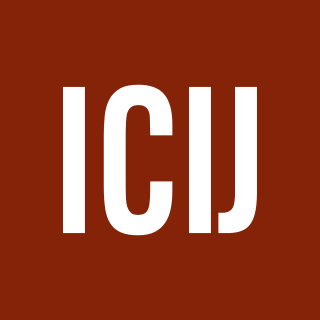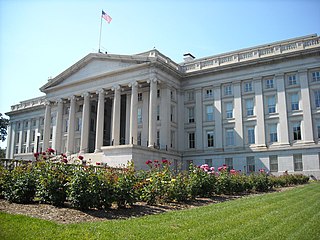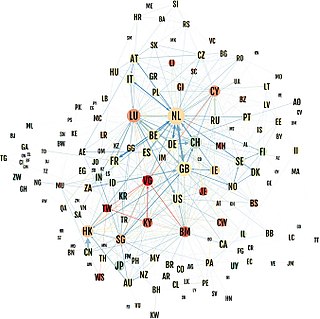External links
| | This article related to a British documentary film of the 2000s is a stub. You can help Wikipedia by expanding it. |
This article is being considered for deletion in accordance with Wikipedia's deletion policy. Please share your thoughts on the matter at this article's deletion discussion page. |
The Spider's Web: Britain's Second Empire is a documentary released in Mexico in July 2017 which details the transformation of the UK as a colonial super power to a global financial power. It suggests that the City of London Corporation and its banks have done tremendous damage to the world economy since the 1960s and that up to half of all offshore wealth (globally) is hidden in one of many British offshore jurisdictions. With contributions from leading experts, academics, former insiders and campaigners for social justice, the film claims to highlight how in the world of international finance, corruption and secrecy have prevailed over regulation and transparency, and the UK is right at the heart of this.
The film was co-produced by Tax Justice Network [1] founder John Christensen, and is based in part on the book, Treasure Islands, by expert on British offshore havens Nicholas Shaxson; an interview with Shaxson is one of its major elements. Christensen was an advisor to the Queen's government of the island of Jersey for a number of years. [2]
| | This article related to a British documentary film of the 2000s is a stub. You can help Wikipedia by expanding it. |

The economy of the Isle of Man is a low-tax economy with insurance, online gambling operators and developers, information and communications technology (ICT), and offshore banking forming key sectors of the island's economy.

Spider-Man is a fictional superhero created by writer-editor Stan Lee and writer-artist Steve Ditko. He first appeared in the anthology comic book Amazing Fantasy #15 in the Silver Age of Comic Books. He appears in American comic books published by Marvel Comics, as well as in a number of movies, television shows, and video game adaptations set in the Marvel Universe. In the stories, Spider-Man is the alias of Peter Parker, an orphan raised by his Aunt May and Uncle Ben in New York City after his parents Richard and Mary Parker died in a plane crash. Lee and Ditko had the character deal with the struggles of adolescence and financial issues, and accompanied him with many supporting characters, such as J. Jonah Jameson, Harry Osborn, Max Modell, romantic interests Gwen Stacy and Mary Jane Watson, and foes such as Doctor Octopus, the Green Goblin and Venom. His origin story has him acquiring spider-related abilities after a bite from a radioactive spider; these include clinging to surfaces, superhuman strength and agility, and detecting danger with his "spider-sense." He then builds wrist-mounted "web-shooter" devices that shoot artificial spider-webbing of his own design.

The United Kingdom of Great Britain and Northern Ireland, commonly known as the United Kingdom, or Britain, is a sovereign country located off the northwestern coast of the European mainland. The United Kingdom includes the island of Great Britain, the northeastern part of the island of Ireland, and many smaller islands within the British Isles. Northern Ireland shares a land border with the Republic of Ireland. Otherwise, the United Kingdom is surrounded by the Atlantic Ocean, with the North Sea to the east, the English Channel to the south and the Celtic Sea to the southwest, giving it the 12th-longest coastline in the world. The Irish Sea separates Great Britain and Ireland. The total area of the United Kingdom is 94,000 square miles (240,000 km2).

A superpower is a state with a dominant position characterized by its extensive ability to exert influence or project power on a global scale. This is done through the combined means of economic, military, technological and cultural strength as well as diplomatic and soft power influence. Traditionally, superpowers are preeminent among the great powers.

Spider-Man is a 2002 American superhero film based on the Marvel Comics character of the same name. Directed by Sam Raimi from a screenplay by David Koepp, it is the first installment in the Spider-Man trilogy, and stars Tobey Maguire as the title character, alongside Willem Dafoe, Kirsten Dunst, James Franco, Cliff Robertson, and Rosemary Harris. The film centers on outcast teen genius Peter Parker, who develops spider-like superhuman abilities after being bitten by a genetically-altered spider.

Eurodad is a network of 54 non-governmental organisations from 25 European countries. Eurodad and its members make up a network, this network researches and works on issues that are related to debt, development finance and poverty reduction.
Offshore balancing is a strategic concept used in realist analysis in international relations. It describes a strategy in which a great power uses favored regional powers to check the rise of potentially-hostile powers. This strategy stands in contrast to the dominant grand strategy in the United States, liberal hegemony. Offshore balancing calls for a great power to withdraw from onshore positions and focus its offshore capabilities on the three key geopolitical regions of the world: Europe, the Persian Gulf, and Northeast Asia.

The Tax Justice Network, is an independent international network, launched in 2003, focused on research, analysis and advocacy in the area of international tax and financial regulation, including the role of tax havens. TJN maps, analyses and explains the impacts of tax evasion, tax avoidance and tax competition; and supports the engagement of citizens, civil society organisations and policymakers with the aim of a more just tax system.

Wind power in Scotland is the fastest-growing renewable energy technology, with 9,347 MW of installed wind power capacity as of June 2020. This included 8,366 MW from onshore wind in Scotland and 981 MW of offshore wind generators.
A tax haven is a country or place with very low "effective" rates of taxation for foreign investors. In some traditional definitions, a tax haven also offers financial secrecy. However, while countries with high levels of secrecy but also high rates of taxation can feature in some tax haven lists, they are not universally considered as tax havens. In contrast, countries with lower levels of secrecy but also low "effective" rates of taxation, appear in most § Tax haven lists. The consensus around effective tax rates has led academics to note that the term "tax haven" and "offshore financial centre" are almost synonymous.
Ronen Palan is an Israeli-born economist and Professor of International Political Economy in the Department of International Politics at the City University London. He has many books and articles on the political economy of the state, globalisation and state strategies, and evolutionary approaches to the study of international relations. Ronen Palan was of the founding editors of the Review of International Political Economy. Palan's major empirical work is the area of offshore financial centres and tax havens. Palan has argued that offshore finance "is certainly not the sole cause for the decline of the nation-state, but it must be seen as an important contributing factor to the decline".

An Offshore Financial Centre or OFC is defined as a "country or jurisdiction that provides financial services to nonresidents on a scale that is incommensurate with the size and the financing of its domestic economy."

The International Consortium of Investigative Journalists (ICIJ) is an independent, Washington, D.C.-based international network of more than 200 investigative journalists and 100 media organizations in over 70 countries. Launched in 1997 by the Center for Public Integrity, ICIJ was spun off in February 2017 into a fully independent organization working on "issues such as "cross-border crime, corruption, and the accountability of power." The ICIJ has exposed smuggling and tax evasion by multinational tobacco companies (2000), "by organized crime syndicates; investigated private military cartels, asbestos companies, and climate change lobbyists; and broke new ground by publicizing details of Iraq and Afghanistan war contracts."
Treasure Islands: Tax Havens and the Men who Stole the World (2011) is a non-fiction book about the secretive role of offshore banks and tax havens in global economic affairs. The book was written by Nicholas Shaxson, a political analyst and associate Fellow of the Royal Institute of International Affairs. It was first published on 6 January 2011.

Nicholas Shaxson is a British author, journalist and investigator. He is best known for his investigative books Poisoned Wells (2007) and Treasure Islands (2011). He has worked as a part-time writer and researcher for the Tax Justice Network, an expert-led lobbying group focused on the harmful impacts of tax avoidance, tax competition and tax havens.

Base erosion and profit shifting (BEPS) refers to corporate tax planning strategies used by multinationals to "shift" profits from higher-tax jurisdictions to lower-tax jurisdictions, thus "eroding" the "tax-base" of the higher-tax jurisdictions.

The Panama Papers are 2.6TB of data or 11.5 million leaked documents that detail financial and attorney–client information for more than 214,488 offshore entities leaked beginning on 3 April 2016. The documents, some dating back to the 1970s, were created by, and taken from, Panamanian law firm and corporate service provider Mossack Fonseca.

Conduit OFC and Sink OFC is an empirical quantitative method of classifying corporate tax havens, offshore financial centres (OFCs) and tax havens.

The Republic of Ireland has been labelled as a tax haven or corporate tax haven by multiple financial reports, an assertion which the state rejects. Ireland's base erosion and profit shifting (BEPS) tools give some foreign corporates § Effective tax rates of 0% to 2.5% on global profits re-routed to Ireland via their tax treaty network. Ireland's aggregate § Effective tax rates for foreign corporates is 2.2–4.5%. Ireland's BEPS tools are the world's largest BEPS flows, exceed the entire Caribbean system, and artificially inflate the US–EU trade deficit. Ireland's tax-free QIAIF & L–QIAIF regimes, and Section 110 SPVs, enable foreign investors to avoid Irish taxes on Irish assets, and can be combined with Irish BEPS tools to create confidential routes out of the Irish corporate tax system. As these structures are OECD–whitelisted, Ireland's laws and regulations allow the use of data protection and data privacy provisions, and opt-outs from filing of public accounts, to obscure their effects. There is arguable evidence that Ireland acts as a § Captured state, fostering tax strategies.

Attiya Waris is a Kenyan Professor at Nairobi University and a writer about financing development from diverse perspectives including illicit financial flows and corporate tax reform. She has spoken up against the policy that allowed Apple to have preferential tax rates in Ireland, She argues that Ireland's tax authorities are run by the upper classes who have forgotten the plight of their country's poor.